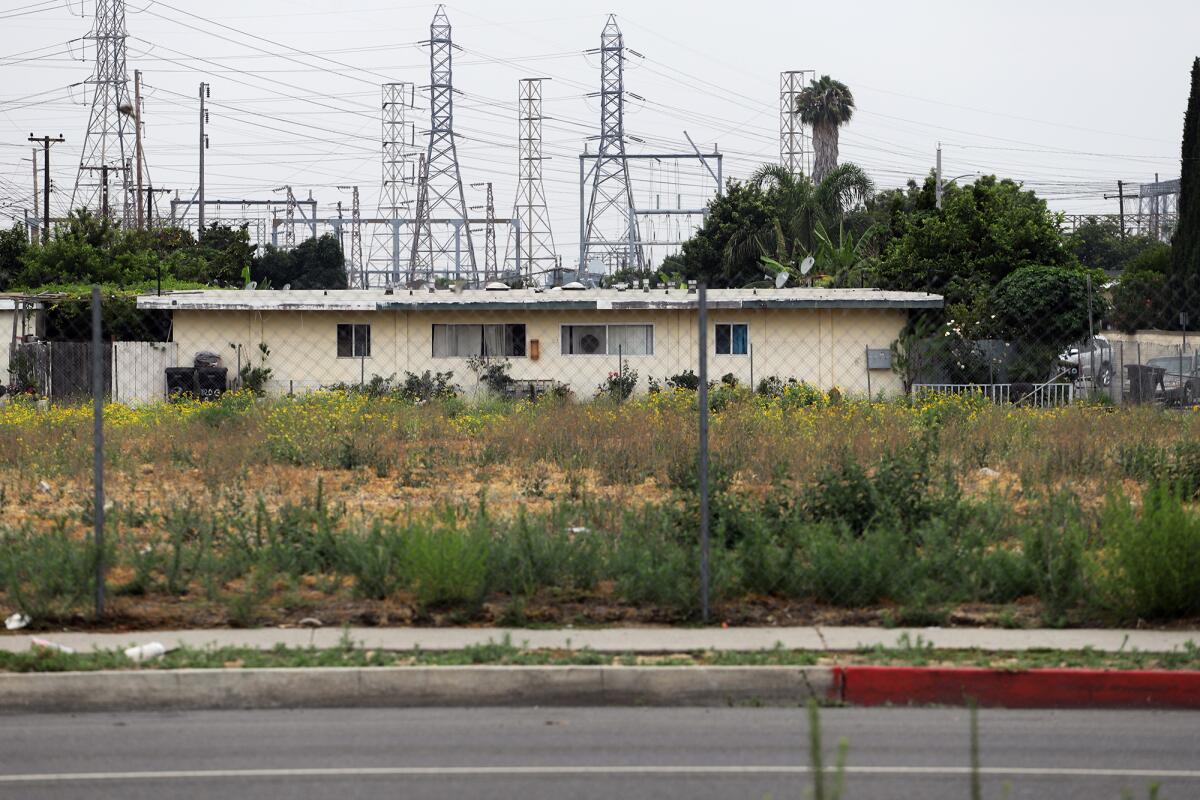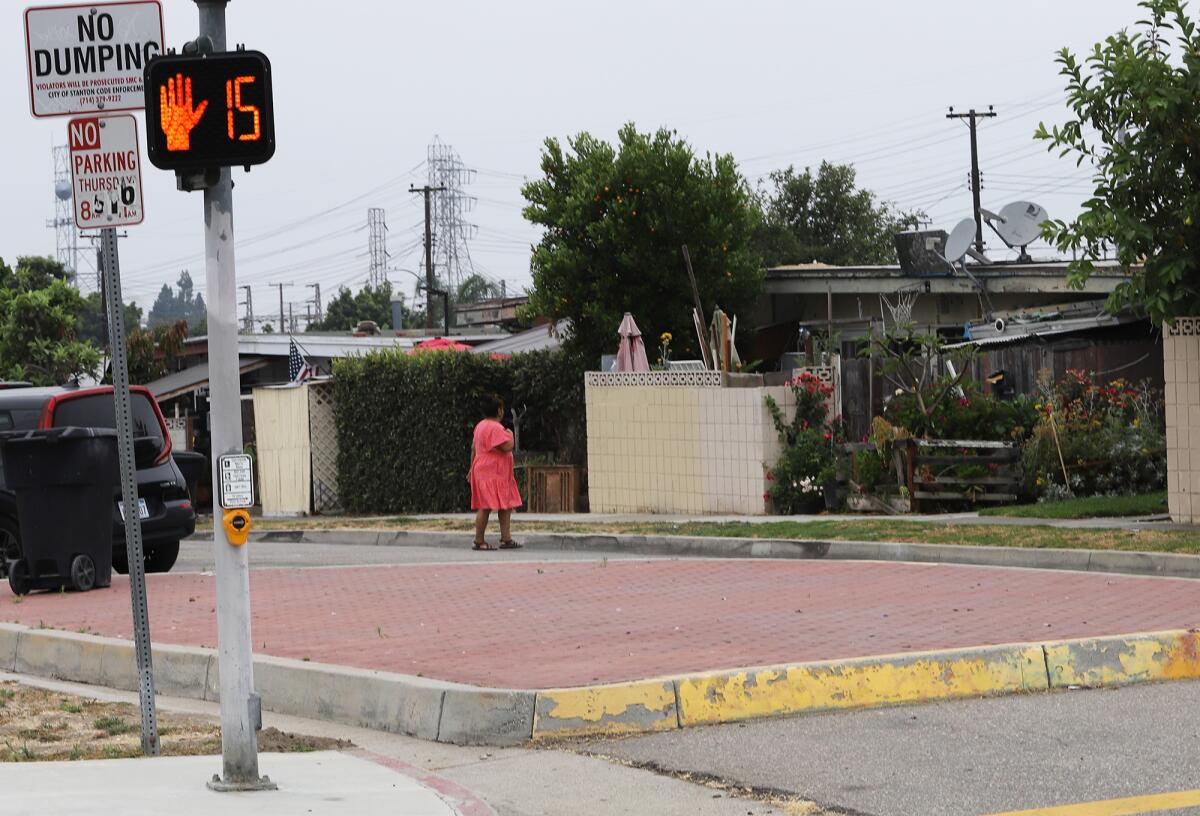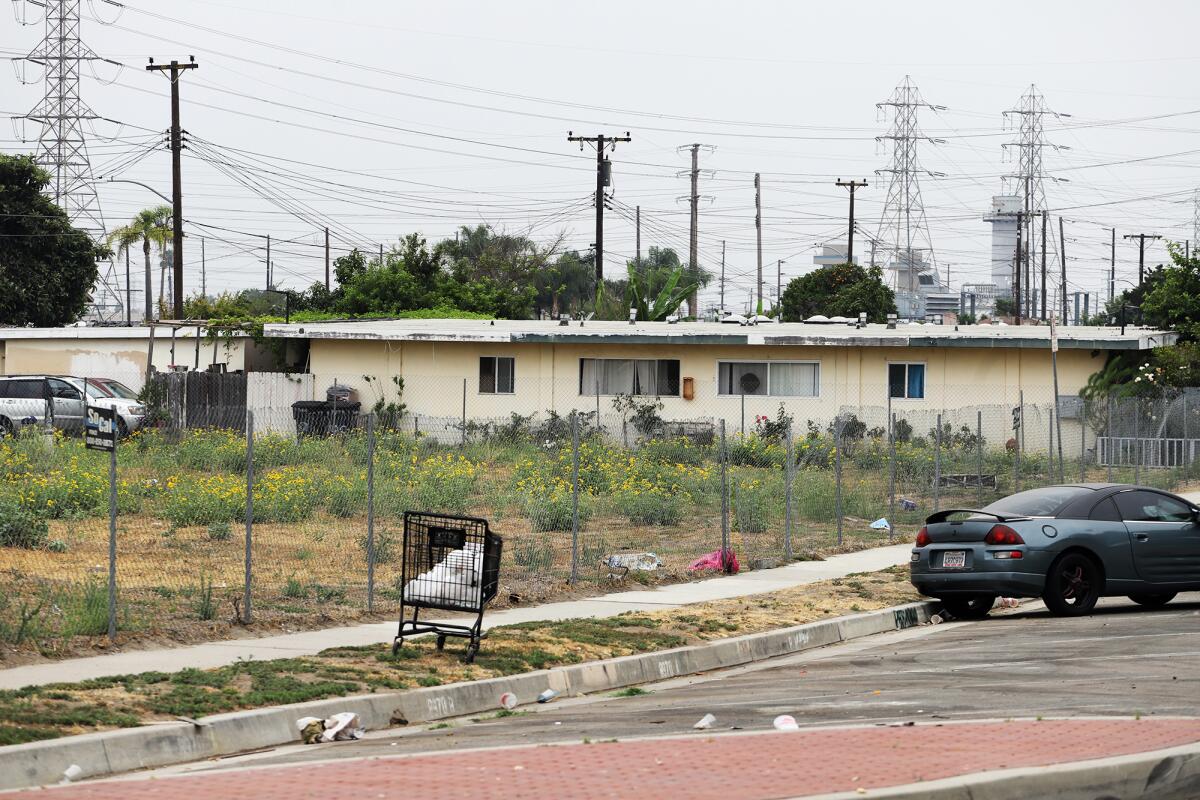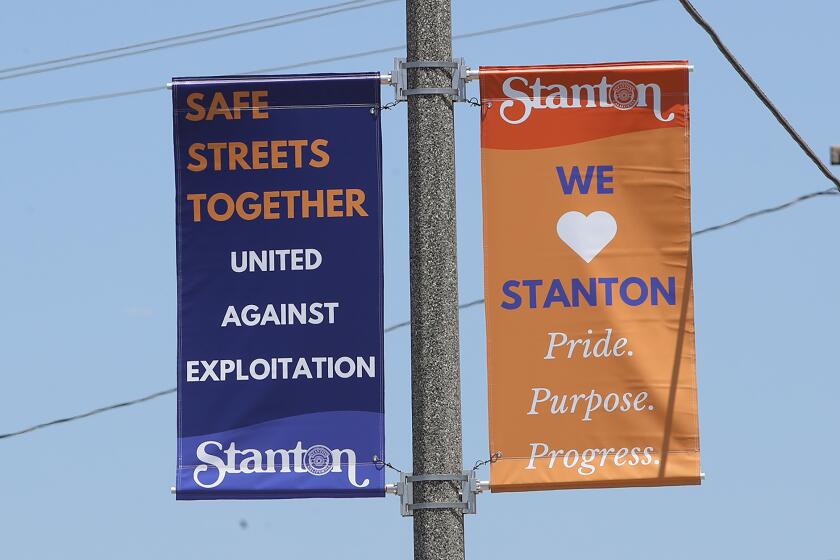Stanton is razing a Latino neighborhood. Is it following the law?

Alma Cortes, a mother of three, has lived in Stanton’s Tina-Pacific neighborhood since she was a young girl in the mid-’90s.
Cortes remembers the Latino working-class community bordering Anaheim off Magnolia Avenue as one where residents knew each other, women swept their patios every morning and where a self-managed system of using trash bins reserved parking spaces amid overcrowding.
“A big reason why people stayed is because they already knew the neighborhood’s routines,” Cortez said. “Obviously, the rent was cheap, too. Landlords weren’t going to raise it. If they did, they were going to have to start investing in repairs.”
But as Stanton has bought almost all of the neighborhood in a years-long effort to redevelop it, Tina-Pacific isn’t so easily recognizable, anymore.
Fenced-off plots mark where fourplexes have been razed by the city, empty units remain boarded up, and tarps cover leaky roofs after a rainy winter, with no future housing development in sight.
In June, Cortes decided to move her family out of their Tina Way apartment, where she was paying $1,100 in monthly rent. She had some relocation assistance from a city-hired company to help cover a security deposit and the first month’s rent for a new apartment outside of Stanton.
“I wanted to get out,” she said. “They offered the money so I said, ‘Let’s just go.’”
As part of Project Homekey, three former motels along or near Beach Boulevard in Stanton are now permanent supportive housing sites.
For the past 15 years, Stanton has sought to raze and replace Tina-Pacific.
The city claimed the blighted neighborhood deteriorated to a point where it represented 15% of all police calls for service at one time.
But a lawsuit filed last year on behalf of the Tina-Pacific Neighborhood Assn., evicted tenants and the Kennedy Commission, argues that Stanton has violated state laws requiring advance relocation planning and assistance for displaced residents.
“A relocation plan isn’t just about money,” said Richard Walker, a Public Law Center attorney on the case. “It’s not just cash for keys. It’s about helping people find housing and making sure that they have a place to go to. If equally affordable housing is not available, then it’s also compensation to help cover the rent for a period of time for those families.”
Stanton’s city manager declined a TimesOC interview request, citing ongoing litigation.

In 2009, Stanton started buying land on the roughly 10-acre site through its redevelopment agency. By 2012, it acquired 25 out of 40 parcels and sought eminent domain powers before such agencies dissolved across the state. The city pushed forward without redevelopment funds until it became the landlord for all but nine remaining parcels.
Most recently, Stanton entered into an exclusive negotiating agreement with developers in 2021 to bring Magnolia Crossing, a proposed community of 116 market rate townhomes and 108 affordable housing units, to the site.
“The city [and] developers are, again, only negotiating,” said HongDao Nguyen, Stanton’s city attorney, during a special council meeting in May. “There’s no project that will displace tenants and there’s no need to replace housing because no project has been reached.”
Council members followed Nguyen’s report by voting unanimously to terminate the exclusive negotiating agreement, citing the suit as the reason why.
“The purpose of the lawsuit has nothing to do with blocking redevelopment in the neighborhood,” said Alfredo Amoedo, a pro bono attorney on the case. “Our plaintiffs want the redevelopment to go forward, but they want it to be done in compliance with the law.”

Stanton is alleged in the complaint to have also indirectly displaced residents through a variety of means as housing has only become more substandard under city ownership.
According to court documents, a company hired by the city is said to have sent relocation notices to residents due to storm damage to their property, but necessary repairs were never made.
A management company working on Stanton’s behalf allegedly refused to accept rent payments from some tenants while miscalculating back rent owed from others, both leading to residents leaving the neighborhood.
When evictions have been carried out, the suit questions whether they were last resort actions or not.
The Kennedy Commission, a nonprofit that advocates for affordable housing, has sent organizers into Tina-Pacific for the past few years. Canvassers collected stories of residents feeling pressured by the management company into signing relocation agreements with little information in Spanish.
The Stanton City Council recently approved the rental of two mobile cameras to discourage sex buying in the city as an early step toward a broader campaign kicking off in July.
“There’s been a barrier with the community, which is predominately Spanish-speaking,” said Cesar Covarrubias, executive director of the Kennedy Commission. “Some of those barriers are, obviously, language and the lack of a definitive plan that allows people to have the ability to understand what they’re entitled to in terms of benefits, what’s being provided and what’s being offered.”
The Kennedy Commission has brokered meetings between residents and city staff in recent years as residents reported a “frustration over a lack of transparency” over the future of their neighborhood.
“Our goal is the creation of more affordable housing units,” Covarrubias added. “We cannot ignore the people being impacted for the purpose of developing this property.”
The lawsuit is demanding Stanton develop a replacement housing plan and halt all future displacement until such a plan is in place.
Since redevelopment money was used to acquire more than half of the parcels in the neighborhood, attorneys argue that Stanton is obligated to replace low-income unit taken off the market with displaced residents being offered the option of returning.

The lawsuit continues in court regardless of Stanton having terminated negotiations with the developers.
“We still believe that the city is doing wrong by these residents,” Amoedo said. “The city’s obligations existed before the exclusive negotiating agreement was entered into and they exist after its termination.”
What the future holds for Tina-Pacific is seemingly as uncertain as ever, especially for those who have called it home.
A friend of Cortes’ left the neighborhood after a leaky roof at her unit wasn’t properly fixed. Some neighbors may take relocation assistance that is being offered while others are staying put for the moment.
Cortes, who doesn’t know what will happen with her vacated apartment, recalls all the correspondence she received about relocation help was in English only.
“They sent us emails about different locations,” she said. “But at the end, I couldn’t just depend on them. I had to look for apartments myself because we weren’t really getting anywhere.”
All the latest on Orange County from Orange County.
Get our free TimesOC newsletter.
You may occasionally receive promotional content from the Daily Pilot.






